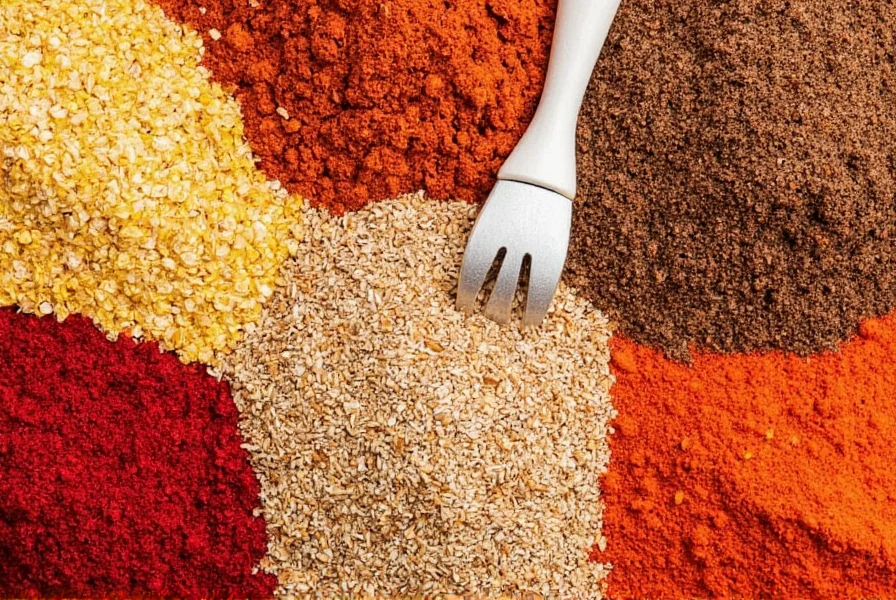What is El Hanout? Key Facts for Cooks
El Hanout is a traditional Moroccan spice blend used for centuries in North African cuisine. It's a complex mixture of over 30 spices including cumin, coriander, cinnamon, and chili peppers, known for its perfect balance of sweet and savory flavors. Unlike single-spice seasonings, El Hanout creates deep, layered taste in dishes like tagines, stews, and roasted meats. This guide covers authentic uses, ingredient breakdowns, and how to buy the best blends for your kitchen.

Key Ingredients and Their Roles
El Hanout's magic comes from its precise spice combinations. While recipes vary by region, these core ingredients define its signature profile:
- Cumin: Earthy base flavor; enhances savory dishes
- Coriander: Citrusy notes that balance heat
- Cinnamon: Sweet warmth for depth without overpowering
- Chili peppers: Adjustable heat level (mild to fiery)
- Cloves and nutmeg: Complex sweetness for slow-cooked dishes
- Saffron (in premium blends): Luxury floral notes for special occasions
Authentic El Hanout rarely contains salt, allowing cooks to control seasoning. Traditional Moroccan apothecaries historically blended these for both culinary and medicinal purposes.
How to Use El Hanout: 3 Authentic Recipes
1. Classic Moroccan Chicken Tagine
Ingredients: 2 lbs chicken thighs, 2 tbsp El Hanout, 1 onion (chopped), 2 carrots (sliced), 1 cup chickpeas, 1 cup chicken broth, 1 tbsp honey, 1 lemon (juiced), olive oil
Steps:
- Marinate chicken in El Hanout and olive oil for 30 minutes
- Sauté onions until golden, add carrots and chicken
- Stir in broth, chickpeas, honey, and lemon juice
- Simmer covered for 45 minutes until chicken is tender
- Top with fresh cilantro before serving
2. El Hanout Roasted Vegetables
Ingredients: 4 cups mixed vegetables (potatoes, bell peppers, zucchini), 2 tbsp El Hanout, 3 tbsp olive oil, salt (optional)
Steps:
- Toss vegetables with El Hanout and olive oil
- Spread on baking sheet in single layer
- Roast at 400°F (200°C) for 25-30 minutes until caramelized
- Serve as side dish or grain bowl topping
3. Homemade El Hanout Spice Mix
Ingredients: 2 tbsp cumin, 2 tbsp coriander, 1 tbsp cinnamon, 1 tsp ginger, 1 tsp paprika, 1/2 tsp cloves, 1/2 tsp nutmeg, 1/4 tsp chili flakes
Steps:
- Combine all spices in a bowl
- Grind lightly with mortar and pestle for even distribution
- Store in airtight container for up to 6 months
Buying Guide: Top 3 Authentic El Hanout Brands
| Product Name | Key Ingredients | Price Range | Best For | Where to Buy |
|---|---|---|---|---|
| Moroccan El Hanout by Spice Island | Cumin, coriander, cinnamon, chili | $8-$12 | Traditional tagines and stews | Amazon, specialty grocery stores |
| Spice Garden Organic El Hanout | Organic cumin, coriander, saffron, nutmeg | $15-$20 | Vegetarian dishes and gourmet meals | Natural food stores, Thrive Market |
| La Maison du Safran Premium Blend | High-grade saffron, cinnamon, cloves, star anise | $25-$35 | Fine dining and special occasions | High-end gourmet shops, brand website |
When purchasing, check for: no artificial additives, clear ingredient lists, and brands with Moroccan origins. Avoid blends with excessive salt or fillers like rice powder.
Frequently Asked Questions
Q: What is the difference between El Hanout and garam masala?
A: El Hanout is Moroccan with cinnamon and chili as key notes, while garam masala is Indian with cardamom and black pepper. El Hanout has more sweetness; garam masala is earthier.
Q: Can I use El Hanout in non-Moroccan dishes?
A: Absolutely! It works in roasted meats, soups, rice dishes, and even salad dressings. Try it on roasted sweet potatoes or in hummus for Middle Eastern fusion.
Q: How much El Hanout should I use per serving?
A: Start with 1 teaspoon per pound of meat or 2 cups of vegetables. Adjust to taste—its potency means less is often more.
Q: Does El Hanout contain salt?
A: Authentic blends never include salt. This allows flexibility in seasoning. Always check labels—premium brands like La Maison du Safran are salt-free.
Q: How long does El Hanout last?
A: Store in airtight container away from light. Whole spices retain flavor for 1 year; ground blends last 6-8 months. Replace when aroma fades.
Q: Is there a vegetarian version?
A: All authentic El Hanout is vegetarian. Spice Garden's organic blend is especially popular for plant-based cooking due to its saffron and nutmeg profile.











 浙公网安备
33010002000092号
浙公网安备
33010002000092号 浙B2-20120091-4
浙B2-20120091-4